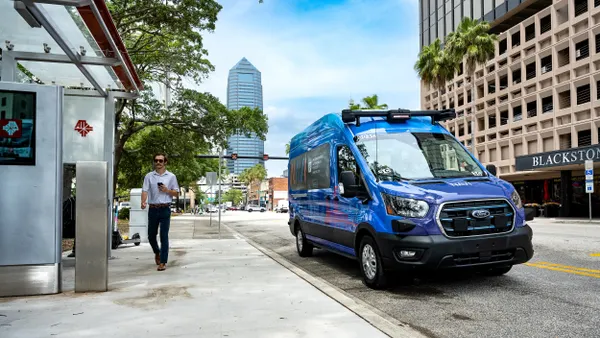UPDATED, Dec. 19, 2019: In conjunction with Daimler AG and the BMW Group, car-sharing service Share Now — formerly known as Car2Go — announced it will fully exit North America, London, Brussels and Florence on Feb. 29, 2020. The news follows an October announcement that it would slowly end service in a handful of North American cities, including Denver and Chicago.
The company cited "the volatile state of the global mobility landscape" and "the rising infrastructure complexities facing North American transportation today" as its two reasons for the decision. Share Now will instead focus its efforts on its remaining 18 European markets that show potential for growth.
Dive Brief:
- Car-sharing business car2go announced it is ending service in five North American cities.
- Service in Austin, TX; Calgary, AB; Denver; and Portland, OR will end on Oct. 31, while service in Chicago will end on Dec. 31. The company says it's refocusing its efforts and resources on the North American markets "that present the clearest path to free-floating carshare success:" Montreal; New York; Washington, DC; Seattle; and Vancouver, BC.
- "We have had to face the hard reality that despite our efforts, we underestimated the investment and resources that are truly necessary to make our service successful in these complex transportation markets amid a quickly-changing mobility landscape," the blog post says.
Dive Insight:
Car2go launched in North America in 2009 and, along with competitors such as Zipcar, was viewed as revolutionary for offering short-term vehicle rentals as a convenient alternative to personal car ownership. It was previously owned by Daimler AG and a business realignment put it under the Share Now venture mobility company umbrella.
Shortly after that realignment, car-sharing business ReachNow announced that it was ceasing operations, and last month, Lime announced it will shut down its Seattle-based car-sharing program LimePod by Dec. 31.
The string of car-sharing businesses folding or significantly reducing market reach in rapid succession has raised plenty of questions about the sector's profitability and business model feasibility. Part of the problem is the break-neck pace at which urban mobility has changed over the past decade. As new mobility services or modes emerge, others fold. This was evident with dockless bike-share cropping up quickly across the United States then suddenly and quietly disappearing in most markets as mobility businesses turned their attention to dockless e-scooters.
The car2go blog post notes that numerous alternatives to personal car ownership have emerged in cities over the past decade and the space will continue to change. "[W]e firmly believe that free-floating carshare has played a role and still does. However, with great change comes great challenges... [W]e know that in order to ensure the future of our business in North America, we have to think differently about where and how we operate," the blog says.
Many urban areas are experiencing a movement away from cars and toward lower-emission forms of transportation. In addition, car-centric transportation businesses are considered more expensive to operate and maintain than those focused on other modes. A hefty amount of capital is needed up-front just to purchase one vehicle, and the loss of a vehicle to theft or retirement at end of life would create a larger impact on a car-focused shared mobility business than a scooter-focused one.
The per-vehicle cost impact became obvious in April, when Chicago police announced that 21 people would be charged in an alleged heist in which at least 100 Mercedes-Benz vehicles that were part of the car2go fleet were stolen. Service temporarily was suspended in Chicago during the investigation and all of the vehicles were recovered. Some of them were said to be rented fraudulently through the car-sharing company's app.
Despite the challenges illuminated by this high-profile case, car2go has indicated theft did not play a part in its departure from Chicago.
Car-sharing has had greater success in Europe than in the United States, in part because of U.S. citizens' high rate of car ownership. The North American cities in which car2go will continue to operate have a lower rate of personal car ownership than in other cities, and citizens tend to be more willing to adopt alternative transportation modes and services.










